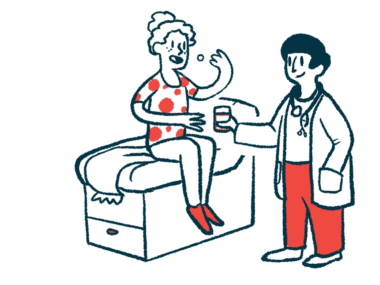CAR T-cell Therapy Descartes-08 Eased MG Symptoms
Written by |

Treatment with Descartes-08, an investigational CAR T-cell therapy, markedly eased symptoms of myasthenia gravis (MG) in three patients participating in a Phase 1/2 clinical trial assessing the therapy’s safety and preliminary efficacy.
“This is the first clinical trial of CAR T-cells for an autoimmune disease. Naturally, the first patients enrolled are some of our most severely affected and difficult-to-treat patients, who have been followed for many years,” trial investigator Tahseen Mozaffar, MD, of the University of California, Irvine, said in a press release.
“At this point, the results should be viewed only as case studies, but the two patients at our study site who received Descartes-08 improved functionally to levels at which I have not seen before,” Mozaffar said.
T-cells are immune cells that have specialized receptors which recognize specific molecules — for example, a piece of a virus — with extremely high specificity. When a T-cell’s receptor engages its target, the T-cell becomes activated to destroy whatever cell contains the identified target, such as a virus-infected cell.
CAR T-cell therapy is a recent technology that involves equipping T-cells with a specially engineered receptor, called chimeric antigen receptor, or CAR, that is designed to allow T-cells to more effectively destroy specific cells of interest. CAR T-cells first were used to treat cancers, particularly blood cancers, by essentially providing T-cells with a CAR that targets molecular patterns found on cancer cells.
In Descartes-08, T-cells are modified with a CAR that targets a protein called B-cell maturation antigen (BCMA). BCMA is found on the surface of plasma cells, a type of antibody-producing immune cells derived from mature B-cells that are thought to play a key role in MG.
This is because plasma cells make autoantibodies, or self-reactive antibodies, that are known to drive MG. Thus, the aim of Descartes-08 is to use BCMA-targeting CAR T-cells to kill these disease-driving immune cells.
Descartes-08 is an autologous therapy, meaning that T-cells are harvested from the patient, then engineered to incorporate the desired CAR, and finally reinserted back into the patient.
Descartes-08 is being evaluated in a Phase 1/2 clinical trial (NCT04146051), sponsored by the therapy’s developer, Cartesian Therapeutics. The trial’s main goal is to determine the investigational medicine’s maximum tolerated dose — the highest dose that can be given safely to patients.
Its effect on MG symptoms and disease severity also are being evaluated.
The trial is actively recruiting 12–15 adults with generalized MG at sites in California and Florida. An additional site in North Carolina is expected to open in the future. Details about trial locations and contacts is available here.
Data on the three patients treated so far indicate that treatment with Descartes-08 was well-tolerated. Notably, there have not been any cases of cytokine release syndrome (CRS), a potentially life-threatening condition characterized by an out-of-control inflammatory-immune response that has been reported with other CAR T-cell therapies.
All three participants have experienced at least a full class improvement on the MGFA Clinical Classification, according to Cartesian. Simply put, this indicates a substantial easing of symptoms — for example, going from moderate to mild muscle weakness.
Participants also showed substantial improvements in the MG composite scale, a measure of overall disease severity. The mean improvement at three months after treatment was more than 50%, according to Cartesian.
“These results, while early, are intriguing because of their consistency and effect size. They are exactly what one would predict when anti-BCMA CAR T-cells are administered to patients with a textbook autoantibody disease,” said Metin Kurtoglu, MD, PhD, Cartesian’s chief medical officer.
Kurtoglu added that “the more important question” is whether these therapies can be used safely and cost-effectively in autoimmune diseases.
“We have much work to do to define the safety and efficacy of Descartes-08 in generalized Myasthenia Gravis … As a physician who once treated generalized Myasthenia Gravis patients, I am excited to see what else we learn from this study,” said Murat Kalayoglu, MD, PhD, president and CEO of Cartesian.
“Together with the entire Cartesian team, we are also eager to study Descartes-08 in other autoimmune diseases such as rheumatoid arthritis and lupus,” Kalayoglu added.




Leave a comment
Fill in the required fields to post. Your email address will not be published.